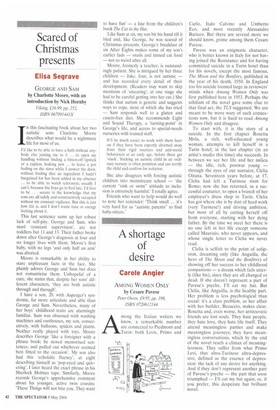A shortage of desire
Carole Angier
AMONG WOMEN ONLY by Cesare Pavese Peter Owen, 0.95, pp. 198, ISBN 0720612144 Among the Italian writers we know, a remarkable number are connected to Piedmont and Turin: both Levis, Primo and
Carlo, Italo Calvino and Umberto Eco, and most recently Alessandro Baricco. But there are several more we should know, prime among them Cesare Pavese.
Pavese was an enigmatic character, who is better known in Italy for not having joined the Resistance and for having committed suicide in a Turin hotel than for his novels, except the most famous, The Moon and the Bonfires, published in the year of his death, 1950. In England too his suicide loomed large in reviewers' minds when Among Women Only was first published here in 1953. Perhaps the nihilism of the novel gave some clue to that final act, the TLS suggested. We are meant to be more wary of such connections now, but it is hard to read Among Women Only and disagree.
To start with, it is the story of a suicide. In the first chapter Rosetta Mola, a rich, well-educated young woman, attempts to kill herself in a Turin hotel; in the last chapter (in an artist's studio this time) she succeeds. In between we see her life and her milieu — the idle, rich, postwar young — through the eyes of our narrator, Clelia Oitana. Seventeen years before, at 17, Clelia had left a Turinese slum for Rome; now she has returned, as a successful couturier, to open a branch of her employer's dress shop in Turin. Clelia has got where she is by dint of hard work (very Turinese!) and driving ambition, but most of all by cutting herself off from everyone, starting with her dying father. By the time we meet her there is no one left in her life except someone called Maurizio, who never appears, and whose single letter to Clelia we never read.
Clelia is selfish to the point of solipsism, dreaming only (like Anguilla, the hero of The Moon and the Bonfires) of showing off her success to her childhood companions — a dream which fails utterly (like his), since they are all changed or dead. If she doesn't represent a part of Pavese's psyche, I'll eat my hat. But Clelia, like Anguilla, is the healthy part. Her problem is less psychological than social: it's a class problem, as her affair with her builder, Becuccio, makes clear. Rosetta and, even worse, her aristocratic friends are lost souls. They hate people, they hate love, they hate life itself. They attend meaningless parties and make meaningless journeys; they have meaningless conversations, which by the end of the novel reach a climax of meaninglessness. They suffer from what Primo Levi, that ultra-Turinese ultra-depressive, defined as the essence of depression: the lack of any desire for anything. And if they don't represent another part of Pavese's psyche — the part that soon triumphed — I'll eat my hat again, or, if you prefer, this desperate but brilliant novel.












































































 Previous page
Previous page